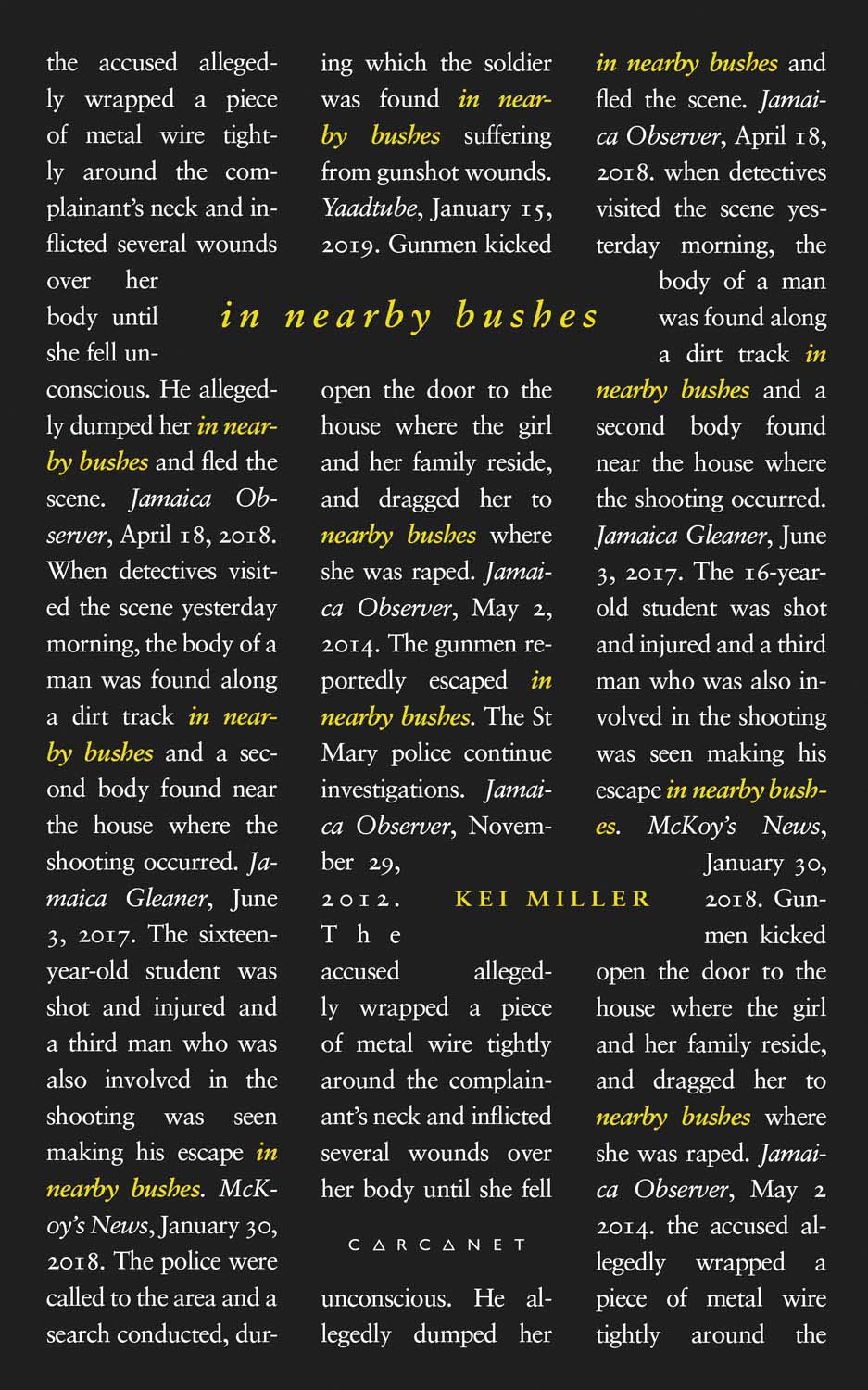In Nearby Bushes
by Kei Miller (Carcanet Press, 88 pp, ISBN 9781784108458)
The cover of In Nearby Bushes features a composite series of newspaper articles in which the title is italicised and highlighted multiple times in yellow, starkly surrounded by white text against a black background. Yet the title is not what stood out for me, at first sight. It was the phrase “where she was raped,” nestled near the cover’s bottom right corner. Jamaican Kei Miller’s newest poetry collection works on the reader’s perception of traumatic violence in much the same way: these poems hold up horrors front and centre, yet it’s often the terror at the seeming fringes that sideswipes us.
To borrow the title of one of Miller’s previous books, there is an anger that moves through these nearby bushes. Producing rage on its own for the page is a considerable yet limited exercise; the truly shocking beauty of these poems is that they set fury close to grace. A landscape may bristle with the pain of unsolved murders, rapes, and other human violations, these poems say, but that does not mean the landscape becomes immune to love. “Sometimes I Consider the Nameless Spaces” asks, “If sometimes it is possible to hear trees breathing, can you also hear them / catch their breaths before the violence of place?”
Repeatedly, In Nearby Bushes presses questions about our mortal bonds to the earth, to our communal and individual senses of safety, about where we go and from whom we flee when that safety shatters. These poems trouble the freshly nailed lids off wholesale wooden coffins, rifling in the physical remainders of the dead for questions that morph into metaphysics. The third segment of the book’s three sections does this work in a series of unsettling, zombifying erasures, holding aloft a spectral lantern.
Honeyfish
by Lauren K. Alleyne (Peepal Tree Press, 90 pp, ISBN 9781845234416)
This prize-winning second collection from US-based Trinidadian Lauren K. Alleyne is an even deeper excavation of the potent mineral ore brought to the surface in her debut, Difficult Fruit. Alleyne’s pen does what so much poetry, for all its pulchritude, does not do: it confronts and names the enemy, the perpetrators of anti-blackness, the Klan-inspired marchers who would desecrate Trayvon Martin and Tamir Rice’s deaths. Not so fast, say the poems in Honeyfish, cutting through the rhetoric of hatred with the accuracy of a butcher’s cleaver separating offal from steak. What the poet serves us is the raw heart meat of love, the praise of an ineffable, indestructible blackness prized by the sun itself. Here, black beauty roams, cavorts, and survives without apology, each line insistent in reclaiming joy amid the mourning processions, against the grain of unlawful death.
A Dark Iris
by Elizabeth J. Jones (Blue Banyan Books, 240 pp, ISBN 9789768267252)
Set in early 1970s Bermuda, this CODE Burt Award for Caribbean Literature 2018 finalist is a graceful portrait of a young artist’s inner conflict, between the pressures of her society and the compulsions of her artistry. Rebekah Eve knows she should be pleased about her acceptance into the elite Meridian school, but her true passion is for the canvas, not the schoolbooks of rote. Rebekah’s art has the power to summon the phantoms of Bermudian history, each with their own stories still left to fully articulate. Through Rebekah’s visions, Jones centres the history of eighteenth-century enslaved Sally Bassett, a prominent figure in Bermudian narratives of rebellion, punishment, and socio-racial tensions. The interlocking layers of feminisms in this book for young readers are unmistakeable and refreshing. Jones excels at the interplay of these distinct voices.
Another Mother
by Ross Kenneth Urken (Ian Randle Publishers, 206 pp, ISBN 9789768286048)
Humility and the complicated eagerness of childhood love animate Another Mother, an unusual but urgently needed memoir. Urken, a self-described Jewish boy from New Jersey, reflects on the life-affirming, world-shaping, accent-hewing influence of his Jamaican nanny, Miss Dezna Sanderson, who left Jamaica in 1988 amid turmoil and under duress. The peculiarity of Urken’s accent, which lilts and pitches with all the authenticity of yaad talk, traces itself to Dezna’s caretaking. Following her death in 2010, Urken finds he cannot rest till he unearths Dezna’s full history, told — he readily admits — imperfectly, but in pursuit of his other mother’s memory. Addressing her, he says, “Dezna, you are the wave through the bus window, the hand on my forehead, the warm dumpling in my belly, the squealed laughter in the backyard amid Bradford pear trees.”
Aftershocks of Disaster: Puerto Rico Before and After the Storm
ed. Yarimar Bonilla and Marisol LeBrón (Haymarket Books, 384 pp, ISBN 9781642590302)
“Resilience” and “perseverance” are often empty watchwords applied by outsiders peering into the Caribbean’s history of, and relationship with, natural disasters. This multi-genre study assembles essays, poems, and photographs to empower a stunning lineage of Puerto Rican voices. The anthology, under Yarimar Bonilla and Marisol LeBrón’s watchful stewardship, involves a chorus of intellectuals, activists, and creative practitioners in the post–Hurricane Maria landscape. In Aftershocks of Disaster, these citizens speak for themselves on what resilience and perseverance mean, not as media soundbites, but as survival mechanisms that have been necessary long before Maria’s landfall. In “If a Tree Falls in an Island” poet Ana Portnoy Brimmer asks us to “consider the fright of a flamboyán / skirts upturned / robbed of red / roots ripped / from the earth’s scalp.”























